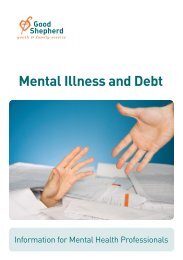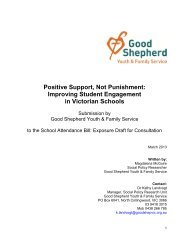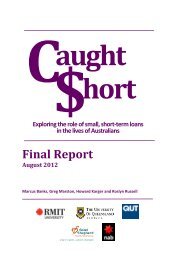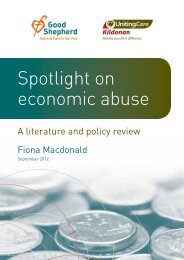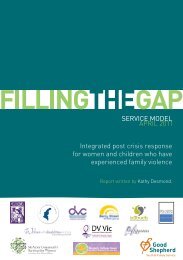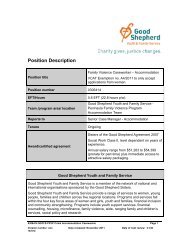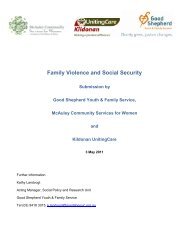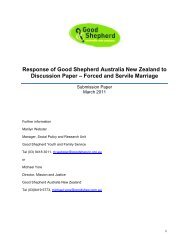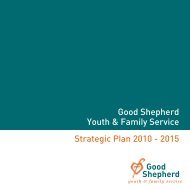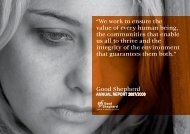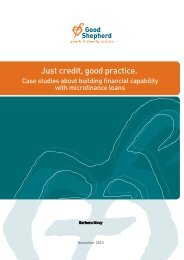Spotlight on economic abuse - Good Shepherd Youth & Family ...
Spotlight on economic abuse - Good Shepherd Youth & Family ...
Spotlight on economic abuse - Good Shepherd Youth & Family ...
You also want an ePaper? Increase the reach of your titles
YUMPU automatically turns print PDFs into web optimized ePapers that Google loves.
In its recent review the ALRC identified three ways in which women could lose their own<br />
superannuati<strong>on</strong> through ec<strong>on</strong>omic <strong>abuse</strong>, each of which involves coerci<strong>on</strong>. The first is<br />
through a superannuati<strong>on</strong> agreement made under the Comm<strong>on</strong>wealth <strong>Family</strong> Law Act<br />
(1975) which is a form of financial agreement made by a couple which is a binding c<strong>on</strong>tract<br />
describing how their property or finances (in this case <strong>on</strong>e or both parties’ superannuati<strong>on</strong>)<br />
are to be dealt with (ALRC 2011b, p. 37). The sec<strong>on</strong>d possible means of loss of<br />
superannuati<strong>on</strong> through ec<strong>on</strong>omic <strong>abuse</strong> is where a partner has been coerced to ‘split’ her<br />
superannuati<strong>on</strong> c<strong>on</strong>tributi<strong>on</strong>s so a proporti<strong>on</strong> is paid into her partner’s fund (ALRC 2011b).<br />
The ALRC (2011b) c<strong>on</strong>cluded that while there were some protecti<strong>on</strong>s in the <strong>Family</strong> Law Act<br />
1975 to address the possibility of ec<strong>on</strong>omic <strong>abuse</strong> through these two means further<br />
investigati<strong>on</strong> is needed to c<strong>on</strong>sider the ways in which federal family courts c<strong>on</strong>sider family<br />
violence in property proceedings. The ALRC (2011d, p. 467) reiterated an earlier<br />
ALRC/NSWLRC (2010) recommendati<strong>on</strong> that “the Australian Government should initiate an<br />
inquiry into how family violence should be dealt with in respect of property proceedings<br />
under the <strong>Family</strong> Law Act 1975 (Cth) (and) (a)ny such inquiry should include c<strong>on</strong>siderati<strong>on</strong><br />
of the treatment of superannuati<strong>on</strong> in proceedings involving family violence”. This<br />
recommendati<strong>on</strong> captures the ALRC’s broader c<strong>on</strong>cern that family violence should be<br />
c<strong>on</strong>sidered by the family court both in assessing c<strong>on</strong>tributi<strong>on</strong>s and in c<strong>on</strong>sidering the<br />
distributi<strong>on</strong> of assets following separati<strong>on</strong>. In their report the ALRC (2011d, p. 466) cite a<br />
case in which the adverse impacts of family violence <strong>on</strong> a pers<strong>on</strong>’s c<strong>on</strong>tributi<strong>on</strong> were taken<br />
into account by a court.<br />
The third possible means of loss of superannuati<strong>on</strong> through ec<strong>on</strong>omic <strong>abuse</strong> is where<br />
superannuati<strong>on</strong> is in a self-managed superannuati<strong>on</strong> fund. These are funds where the<br />
trustees are the <strong>on</strong>ly members of the fund and over 90 per cent of such funds have two<br />
members, mostly spouses (ALRC 2011c, p. 467, fns 32-36). The ALRC (2011c) c<strong>on</strong>cluded<br />
that victims of family violence who are also trustees of self-managed superannuati<strong>on</strong> funds<br />
require additi<strong>on</strong>al protecti<strong>on</strong> and made a number of recommendati<strong>on</strong>s for changes to the<br />
guidelines provided to self-managed superannuati<strong>on</strong> fund trustees by the regulator—the<br />
ATO—including the provisi<strong>on</strong> of specific informati<strong>on</strong> and examples c<strong>on</strong>cerning family<br />
violence. The ALRC (2011d, p. 471) also pointed to the need for the ATO to avoid<br />
compliance acti<strong>on</strong>s that exacerbate or harm the disadvantage suffered by a fund trustee<br />
experiencing family violence but did not go as far as recommending that the ATO should be<br />
required to c<strong>on</strong>sider family violence when determining appropriate compliance acti<strong>on</strong>,<br />
apparently in resp<strong>on</strong>se to stakeholder submissi<strong>on</strong>s from the Australian Institute of<br />
Superannuati<strong>on</strong> Trustees. The other possible areas for reform were identified as c<strong>on</strong>cerning<br />
professi<strong>on</strong>al standards, training and licensing exempti<strong>on</strong>s for self-managed superannuati<strong>on</strong><br />
fund advisers and the ALRC directed these to the nati<strong>on</strong>al government bodies (ATO, ASIC<br />
and Treasury) that are involved in reform of regulatory arrangements for financial advice.<br />
A final issue with superannuati<strong>on</strong> c<strong>on</strong>cerns whether a woman leaving <strong>abuse</strong> can access part<br />
of her superannuati<strong>on</strong> funds early. Normally, funds are preserved until retirement age<br />
although there is provisi<strong>on</strong> for early release of some funds <strong>on</strong> the grounds of financial<br />
hardship or <strong>on</strong> compassi<strong>on</strong>ate grounds. The ALRC (2011c) has proposed a range of<br />
changes to administrative guidelines to enable better decisi<strong>on</strong>-making with proper<br />
c<strong>on</strong>siderati<strong>on</strong> of family violence, while also accepting arguments that the financial hardship<br />
faced by women <strong>on</strong> leaving <strong>abuse</strong> should be properly addressed through the income support<br />
system. At least <strong>on</strong>e submissi<strong>on</strong> to the ALRC <strong>on</strong> this issue pointed to the fact of women’s<br />
existing disadvantage in accumulati<strong>on</strong> of superannuati<strong>on</strong> and argued that early access<br />
compounds this disadvantage (Women’ Legal Service NSW 2011). A further issue identified<br />
by the ALRC was the potential for any loosening of early release provisi<strong>on</strong>s to make it easier<br />
for an abusive pers<strong>on</strong> to coerce a woman to seek release of her superannuati<strong>on</strong> savings.<br />
Proposals made by the ALRC include some minor loosening of qualifying periods <strong>on</strong> income<br />
support payments for eligibility and for the Australian Prudential Regulati<strong>on</strong> Authority to<br />
42



